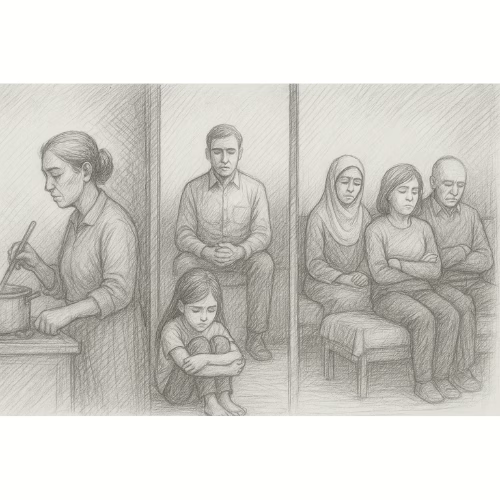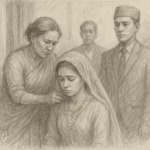In every corner of the world, the walls of a family home are more than just bricks and plaster. They are witnesses to a kind of violence that leaves no visible scars: the violence of silence. In the dim kitchen of a Vietnamese household, the mother stirs a pot of soup without speaking. The clinking of the spoon on the metal pot becomes the only sound that dares to exist. In a Palestinian refugee camp, a father sits cross-legged, his lips tight, staring into the distance as if the weight of history rests behind his eyes. In a small apartment in Paris, the cold walls of the living room echo the unsaid words of a couple who once loved each other but now speak in measured silences.
These walls are meant to protect, but they also imprison. Within them, shame and duty grow like weeds. Here, children learn early that their pain must be hidden, that the family’s dignity matters more than their own voice. Here, wives bear the weight of generations of submission. Here, fathers drown their tenderness in alcohol or tradition. Here, grandmothers whisper prayers that no longer reach God, only to the stale air of their bedrooms. The silence within these walls is not peace—it is a burial ground for the soul.
In Asia, silence is not just a cultural quirk; it is a survival strategy. In Vietnam, children are taught to “nhịn” (endure) from an early age, a word that means to swallow both pain and truth. The concept of “hiếu” (filial piety) binds children to the expectations of their parents, even when it tears at the fabric of their own desires. A daughter who loves another woman will not speak of it. A son who cannot become a doctor cannot bring himself to say he wants to be an artist. The family’s image is a porcelain mask, and any crack is an unforgivable sin. In Japan, the family is a house of mirrors, every reflection carefully curated. Fathers work themselves to death in silent sacrifice—karōshi—while mothers bow to the unspoken rules of “gaman” (endurance). In South Korea, the ghost of Confucianism still hovers over dinner tables: a father’s silence is a command, a mother’s quiet sigh is a rebuke. Young people kill themselves in tiny rooms, unable to scream into a world that does not want to hear. In the hush of these Asian homes, children become shadows. They are praised for their obedience, for the way they vanish themselves for the family’s honor. They learn to smile politely, to say “dạ” and “vâng” (yes), but they forget how to say “I want” or “I hurt.”
In the Middle East, silence has been honed by centuries of war and patriarchy. It is a language of protection and erasure. A young woman in Syria learns to keep her head down, her voice soft, even when the bombs stop falling. In the West Bank, silence is how mothers grieve the sons they have lost to the occupation—loud wails in the street are for the dead, but in the home, grief is folded away like a winter blanket. Here, the family is both a fortress and a prison. A girl in Lebanon grows up watching her mother serve endless cups of coffee to uncles who never ask about her dreams. A son in a conservative family in Jordan keeps his poetry hidden, because poetry is a woman’s game. Honor is a word that crushes all other words beneath it. But silence here is not just obedience—it is survival. In Gaza, every whisper carries risk. In Tehran, an offhand complaint can bring a knock on the door at midnight. The home becomes a cage, but the cage keeps you alive.
In Africa, the family is a lifeline in communities shattered by colonial borders and violence. But it can also be a place where women’s voices are buried. In Ethiopia, a mother wraps a cloth around her mouth when she cries—no one must see her weakness. In South Sudan, girls are married off as soon as they bleed, their bodies traded in dowries of cattle and silent suffering. In the silence of these homes, children learn to carry the weight of adult wars. A boy in Rwanda grows up with the hush of a father who saw genocide but never spoke of it. In the cities of Nigeria, a young girl’s silence is a form of armor against the casual violence of men who believe a woman’s no is just the beginning of negotiation. These families are strong, yes. But sometimes strength is just another word for refusing to scream.
In the West, silence often dresses itself as politeness. In France, children are taught to be “sage” (well-behaved), to keep their voices low at the dinner table. In America, families gather for Thanksgiving and avoid politics, each unspoken disagreement hanging in the air like smoke. In Britain, the phrase “stiff upper lip” still governs how men learn to swallow grief and women learn to endure betrayal. Western homes are filled with light and comfort, but sometimes that comfort is a trap. A teenager in Germany, alone with her thoughts because her parents are too busy to notice. A father in Sweden, numbing himself with work and gym visits because vulnerability is a foreign language. Here, the silence is not about survival, but about image. It is a cultivated ignorance—a refusal to admit that even in the most “civilized” families, wounds can fester if no one dares to name them.
Across Asia, the Middle East, Africa, and the West, the silence within walls speaks a thousand languages. It wears different clothes, different customs, but it always says the same thing: hide your pain. In these homes, to speak is to betray the family. To break the silence is to risk everything. Yet if we never break it, who will remember the child who never learned to cry? Who will see the mother who dreams of escape in a language she cannot name? Who will hold the father’s hand when he finally admits he is afraid? In the end, the only way out is to speak. And even if no one listens, the act of speaking is the first crack in the wall.


